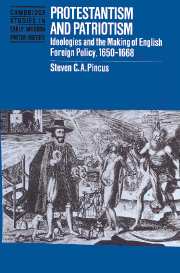Book contents
- Frontmatter
- Contents
- Acknowledgments
- List of abbreviations
- 1 Introduction
- Part I The rod of the Lord: ideology and the outbreak of the First Anglo-Dutch War
- Part II To unite against the common enemy: the 1654 Treaty of Westminster and the end of apocalyptic foreign policy
- Part III Popery, trade, and universal monarchy: ideology and the outbreak of the Second Anglo-Dutch War
- Part IV The Medway, Breda, and the Triple Alliance: the collapse of Anglican Royalist Foreign Policy
- Conclusion
- Bibliography
- Index
- Titles in the series
Conclusion
Published online by Cambridge University Press: 01 October 2009
- Frontmatter
- Contents
- Acknowledgments
- List of abbreviations
- 1 Introduction
- Part I The rod of the Lord: ideology and the outbreak of the First Anglo-Dutch War
- Part II To unite against the common enemy: the 1654 Treaty of Westminster and the end of apocalyptic foreign policy
- Part III Popery, trade, and universal monarchy: ideology and the outbreak of the Second Anglo-Dutch War
- Part IV The Medway, Breda, and the Triple Alliance: the collapse of Anglican Royalist Foreign Policy
- Conclusion
- Bibliography
- Index
- Titles in the series
Summary
The three Anglo-Dutch Wars of the seventeenth century have never caused much concern for historians content to separate domestic and foreign policy. Whether ideology or factional squabbles accounted for domestic political turmoil, England's foreign involvements could always be explained by geopolitical considerations. Since contemporaries thought of England and the United Provinces as the two great commercial states of seventeenthcentury Europe, it seemed perfectly reasonable to assume that both sides understood themselves to be economic rivals. The long lists of commercial disputes placed on the negotiating table by the trading companies from each side provides ample confirmation for scholars predisposed towards an economic account of these wars. The willingness of both the English Commonwealth and the Restored Monarchy to fight the same enemy appears to clinch the argument: the English fought the Dutch, it is said, because their economic interest demanded it. England's emergence from these struggles as the great trading power of the eighteenth and nineteenth centuries, coupled with the United Provinces' resubmergence into the watery bogs from which they had unnaturally sprung, has overshadowed English defeats in the second and third Anglo-Dutch Wars. The English might have lost the military battle, but they won the economic war.
A close examination of the first two of these Anglo-Dutch confrontations, however, reveals that these all-too-plausible hypotheses have little basis in the contemporary evidence. Neither war was an English attempt to capture trade routes from a chief economic rival.
- Type
- Chapter
- Information
- Protestantism and PatriotismIdeologies and the Making of English Foreign Policy, 1650–1668, pp. 441 - 452Publisher: Cambridge University PressPrint publication year: 1996



